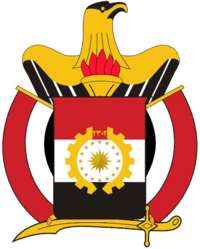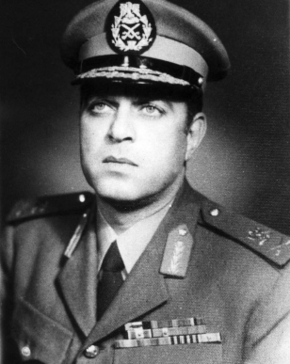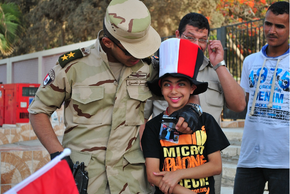Ettehâd
 |
|---|
| This article is part of a series on the politics and government of Zorasan |
Ettehâd (Pasdani: اتحاد) or Ittiḥād (Rahelian: اِتِّحَاد) is a Zorasani political expression meaning literally “union” or “unification.” This expression, also used within the official name of the state (Union of Zorasani Irfanic Republics), also serves an ideological purpose. According to Sattarist Renovationism, the term Ettehad refers to the “unification of the heart, soul and mind” and breaking down elitism, ethnic, sectarian, cultural, linguistic and class divides into one singular community. The term constitutes the ethos of the one-party state in Zorasan and is widely seen as inherently totalitarian, by wedding the entire concept of community and society with the nation and state.
Initially devised in the 1920s, the term and concept evolved steadily over a period of time. From the 1940s through to the early 1970s, Ettehâd was primarily stated as an end goal in relation to the repression of enemies and critics of the Sattarist state and the Normalisation. Following the Irvadistan War and the unification of Zorasan in 1980, the concept evolved toward its current form in which all forms of societal division are broken down and the population lives in "complete organic harmony." This took the form of establishing improved social mobility, meritocracy and repressing any form of class, cultural, ethnic or elitist difference. A series of public civil organisations were established to promote cross-sectional unity, notably the All-Union Service for Young Labour, which sends 14-16 year old members to either urban or rural families for summer-long periods. The doctrine of Blood, Sweat and Labour was introduced to promote the notion of "organic harmony between the soldier, farmer and worker" mostly in the realm of propaganda and education. During the Reform period (1990-2005), the notion of Ettehâd changed once more, as the country liberalised economically, culturally and socially. The reform-led government sought to promote individualism in line with its plans to open up the economy to private businesses, though resistance from the right-wing of the party and the military stalled progression toward "de-collectivising society", in response the government of the period opted to promote Ettehâd around shared values and a civic nationalism. These liberalisations coupled with the emergence of fierce class differences and conflict emerged in the early 2000s, sparked fierce political struggles between the reformist leadership and the hardliner faction of the party, backed by the military. These tensions led to the Turfan and the restoration of conservative Sattarist-Renovationist government in 2005 and a new hardline constitution in 2008. Since then, Ettehâd has returned as concept for collectivism, national unity and subordination to the state.
The term features prominently in Zorasani state propaganda and political discourse, notably in the forms of describing the socio-political basis of the state as the “union of the street, mazar and barracks”, about the role of civil, religious and military power-centres within the state.
Development
The term Ettehâd in its ideological and socio-political form was first used by Mahrdad Ali Sattari, the chief Union Father prior to the establishment of the Pardarian Revolutionary Resistance Command in 1924, in a series of articles he authored. In the widely perceived first case of its use, Sattari wrote in April 1924, “if we are to achieve our end goals, we must do all that can be done to form amongst our people, a union of heart, soul and mind. We must unite them at the deepest intimate level that the union between them makes in them, one singular entity capable of defeating all those arranged against it. Our union must transcend the physical into the metaphysical, psychological and emotional.”

Other senior figures around Sattari took to writing their positions on what Ettehâd would mean beyond the political term for a future state. Hossein Khalatbari wrote in 1925, “the union between the peoples of Zorasan must be of every dimension perceived by the human mind. It must meld them together spiritually, emotionally, physically, it must be the all-encompassing, all-demanding and all-consuming entity, that lifts the people above the petty differences and divisions of the colonial-capitalist ideologies.”
Erkin Dostum wrote the same year, “Ettehâd is the transcendent state of mind, heart and soul, in which the citizen forgoes individualism for the greater whole, the Union of every family, person and being. It is the abandonment of tribe, class, status and self-interest in complete subordination, supplication, and service to the union-state and with the state. It is the total worship of the Union and therefore each other.”
By 1926, the PRRC led by Sattari appeared to coalesce around the Dostum-interpretation of Ettehâd, which eventually evolve into a series of policies by the PRRC enacted within the territory it controlled prior and during the Pardarian Civil War. Its victory the conflict in 1950, saw the new government led by Sattari enact what it called the “Great Union Campaign” (Kârzâr-ye Bozorg-e Ettehâd) in which it pursued the destruction of individualism, classism, elitism, and difference over religion. The establishment of the Union of Khazestan and Pardaran in 1953, brought further impetus to Ettehâd’s evolution into a formalised and prominent feature of political discourse and policymaking, from then including the objective of unifying the Pardarians and Rahelians, as well as other minorities, into a single cohesive society in line with Pan-Zorasanism.
In a speech in 1954, Mustafa Al-Kharadji, the leader of the Khazi Revolution and Union Father said, “Ettehâd is the means in which we cease abiding by the rules established by the imperialists, it is the means in which we abandon their words Rahelian and Pardarian and submit ourselves wholly and without restraint or question, to the Zorasan we are in service to. In the union of heart, mind and soul, we are one before and within the Union.” Prior to unification 1980, the concept of Ettehâd constituted the foundation of the Normalisation, which saw among other actions, the forced resettlement of ethnic minorities, the destruction and repression of cultures, traditional values and religions in the aim of establishing a “singular identity rooted in the Union.”
Policies
Consolidating the Union (1980-1990)
Following the end of the Irvadistan War and the unification of Zorasan in 1980, the National Renovation Front opted to radically alter the agreed interpretation of Ettehâd. This new interpretation was devised to secure three aims; consolidate the expanded one-party state, stabilise the Union and unify the peoples of the former United Rahelian People’s Republic with those of the Union of Khazestan and Pardaran. While these aims were approached separately, they were intertwined as success would ostensibly consolidate the NRF’s authority and control over Irvadistan and Riyadha.
The approach to Ettehâd was radically different post-1980, with State President Javad Jahandar establishing the Union Committee for Social, Spiritual and Emotional Unification. The committee, comprised of four prominent party members (Homayoun Afshari chairing and deputised by Hakem al-Ragheb, the finance minister), opted to utilise real-life policies to foster Ettehâd among the populace. The Committee was granted limited authority over the Northern Reconstruction and Restoration Commission, the body tasked with rebuilding the two northern Union Republics. The Committee saw rapid reconstruction as the first step toward fostering Ettehâd by "ensuring that no citizen north of Khazestan lives in squalor brought about by war, for there resentment and envy of those south of that line will only grow." The Committee did succeed in expediting the return of utilities, primarily electricity and water to the cities, while introducing the "solidarity ration", in which food stuffs destined for cities in the former UKP were limited to feed the north's rural population, while was brought about disgruntlement in Pardaran and Khazestan especially, it served to diminish the possibility of starvation in the north.
The Committee’s recommendation that the NRRC employ thousands of demobilised and demoralised URPR troops for construction and rubble clearance was also regarded as a success. The role of the Committee however was steadily diminished until 1984, when it was abolished and succeeded by the Union Ministry for Popular Mobilisation.

The UMPM was established by the Union Command Congress in 1984 to “mobilise in the spirit of the populace, the Sattarist-Renovationist ideal and to mobilise them into the collective, Irfanic, revolutionary way of life.” Homayoun Afshari was the first Minister for Popular Mobilisation and worked closely with the Finance, Irfanic Culture and Guidance ministries and the military to coordinate policies. In 1984, the UMPM produced the doctrine of Blood, Sweat and Labour (XunʿAraq va Kār), which argued the soldier, the farmer and the labourer lived in an organic harmony by virtue of their interdependence. In 1985, the UMPM introduced mandatory school uniforms, private schools were abolished, having only emerged in Pardaran in the 1960s, and state propaganda within education about the perils of classism, elitism and cultural divides were established. The same year, the UMPM with the assistance of the Union Ministry for Education and Literacy established the All-Union Service for Young Labour, which was a body tasked with organising summer-long work placements for 15-16 year olds. However, the USYL was instructed to place urban members among farming communities and farming communities to be placed with urban families, in the hope that this would breakdown urban-rural and class divides. The introduction of mandatory education for those aged 5-16 was key in supporting the scheme, it was further empowered by applying extraciricular credit toward securing a university placement.
Afshari approached Ettehâd’s role in diminishing class differences by advocating social mobility and meritocracy. Afshari noted that the National Renovation Front’s pyramidal hierarchy was constructed in a way that only success, positive results and experience guarantee promotion from the lower party-strata and sought to replicate this in Zorasani society. In a speech to the NRF Committee on Popular Mobilisation, Afshari said, “meritocracy is the means upon which we dismantle the divisions of the Euclean origin. Class, elitism, religion, culture and regional, all must be destroyed, and to do that we must embrace meritocracy. However, it only works in the political sense if there is a visible ladder that any and all can climb by virtue of their merits.” His calls for a physically recognisable hierarchy was welcomed by the military, who since 1980, had established a benefits and welfare package for career soldiers and officers that would essentially guarantee social improvement through military service. From the early 1980s through to the late 1990s, the Zorasani state through propaganda and public events attempted to forge a de-facto hierarchy, with the party and military elite at the top, followed by the officers and the middle class, and finally, the working class and soldiery, while simaltaneously arguing the hierarchy was open and pourous.
In 1986, the government sought to expand on a "state-meritocracy" by introducing a streamlined but more strident series of examinations for civil service jobs at all three-levels of government. Those who took them would be given randomly generated “identification numbers”, which would be used to identify their examination papers, removing the prospect of bias or discrimination based on name or gender. Pre-liminary interviews would be meticulously recorded and reviewed by a second board of interviewers who would not be told the name or gender of the interviewee. This policy remains in place today. Laws prohibiting the discrimination of citizens based on name (an identifier of ethnicity) were introduced in 1987.
The Zorasani government’s focus on making education universally accessible was key to establishing a “meritocratic union” and undermining class divides. Though according to historians, the government’s fear over class was misplaced, owing to the lack of any established middle class in large parts of the country. The class fear would, however, emerge during the 1990s and 2000s as the country rapidly developed economically and its middle class exploded in number. In 1988, the government introduced a new unified and simplified tax code, which introduced certain reductions for lower and middle-class citizens and new state-subsidised pensions for blue collar workers, reducing the pensions gap that was seen in the UKP. Aided by the rapidly growing economy, new industries, jobs and increasing wages, upward social mobility was three-times as likely compared to both the former UKP and United Rahelian People’s Republc, by 1999, this had increased to four times as likely.
One of the most defining features of the immediate post-unification period was the 1988 Dress Code Law, which formally mandated the wearing of clothes in line with Irfanic law. This law, though devised to cap off the Irfanisation of Zorasan, also served the purpose of fostering Ettehâd by uniformalising society and removing any semblance of class difference.
Reform period (1990-2005)
Post-Turfan (2005-present)
Following the events of the Turfan, the hardliner government under Hamid Alizadeh moved swiftly to restore Ettehâd in a more severe and total form. At the 2006 Union Command Congress, the National Renovation Front endorsed the government’s plan to expand state control over the private and social lives of citizens. The Union Minister for Popular Mobilisation, Vahid Isfandiar proposed the “ten-point plan for social harmony”:

• Complete state control over the media (printed, televised, radio and digital). To “deny the rise of consumerist media that will sectionalise the community and promote division.”
• Complete state control over the arts, to restore Sattarist-Renovationism in creative expression and to promote a single universal artistic sphere.
• Restoration of “popular mobilisation of the patriotic, revolutionary spirit.” This led to the return of weekly or monthly mass rallies based around singular messages, such as celebrating the worker, farmer, or soldier, or condemning enemies of the Union.
• Empowering the “Block and Quarter Leaders” in arranging social events for their respective areas of influence.
• State subsidised travel companies to provide cheap vacations for blue collar workers.
• Emphasising the role of Alawdad, the Irfanic article of faith relating to charity.
• Increasing state use of the Irfanic faith in society, politics, and culture to further break down “false and nebulous divisions.”
• Restoring mandatory membership of 10 to 16-year-olds in the Young Pioneers of the Union (Peeshahang) and Young Thinkers of the Union for university students.
• Further elevating the Zorasani Irfanic Revolutionary Army as the ultimate manifestation of the “Zorasani Man” and the unifying institution that represents the ideals, values and principles of the Union.
• Televising Self-Rectification Actions by NRF officials, where they confess and apologise for failing to enact government policy sufficiently or on time.

Two major public holidays were introduced under Isfandiar's tenure as Minister for Popular Mobilisations, the first was Guardian Week (Hafte-e Pasdarān), in which personnel from the military conduct parades, exhibitions and visit schools and kindergardens and teach children basic military drills and training and promoting careers within the military to the males. Guardian Week is held during the first week of may, which begins with Union Workers Day (international workers day) and is capped off on the Friday with a public holiday and a major military parade in every Union-Republic capital and Zahedan. Union Central Television, the state broadcaster dominates the weekly programming with military produced films, series and mini-movies and documentaries on Zorasani Unification.
The second event introduced in 2010 was the Rally of the Mothers of the Union, held every first Friday of July. The event is a public holiday and celebrates the role of women in Zorasani society, both as mothers and patriotic workers, notably it also lauds women with careers and housewives in equal measure. The rally in Zahedan is led by female singers, poets and politicians, while the government televises the issuing of Order of the Sattarist Daughter, a medal for women who distinguished themselves in the realms of work, civil society or science and engineering. Since 2017, the rally has also been focused on the role of women within the National Renovation Front and proclaiming the "Zorasani state to be the greatest liberator of women in Coius."
In propaganda
Throughout Zorasan's history, the concept of Ettehâd has been the central feature of state propaganda, promoting a sense of mystical unity, a form of a national soul uniting all Zorasanis, regardless of ethnicity or language (note that ethnicity is not recognised by the Zorasani state). Nevertheless, this soul was regarded as related to the state, in which all Zorasanis are bound and protected. Rhetorically, the state and politicians have consistently referred to the political union of the union-republics as ethereal and spiritual or societal in nature.
Ali Sayyad Gharazi, Address to the Union Command Congress, 1970
